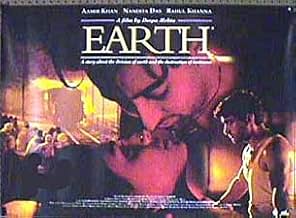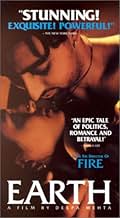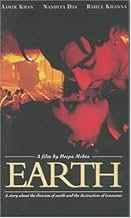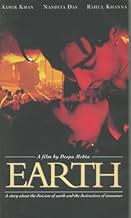Nel 1947, durante la Partizione dell'India, una bambina vede la sua tata divisa tra due amanti mentre il conflitto religioso travolge le loro vite.Nel 1947, durante la Partizione dell'India, una bambina vede la sua tata divisa tra due amanti mentre il conflitto religioso travolge le loro vite.Nel 1947, durante la Partizione dell'India, una bambina vede la sua tata divisa tra due amanti mentre il conflitto religioso travolge le loro vite.
- Regia
- Sceneggiatura
- Star
- Premi
- 3 vittorie e 2 candidature totali
- Hariya
- (as Raghuvir Yadav)
- …
- Butcher
- (as Pavan Malhotra)
Recensioni in evidenza
The score by A.R. Rahman is a powerful blend of Indian and western film music, lightening the joyous moments (such as the kite-flying scene) and deepening the foreboding in other scenes (such as the train of death).
As an Indian-born American this film had an intense emotional impact on me, as it did with my best friends sitting to my right and left - a Muslim and a Sikh. It seems melodramatic but we sat in our seats, tears in our eyes, stunned.
One of the things I look forward to after every movie going experience is the inevitable discussion that follows. All three of us were silent for almost half an hour. It dawned on us that we could have been the group of friends who were so close at the beginning only to be divided by our demons in the name of religion at the end.
As an aspiring film-maker, I would like to congratulate Deepa Mehta for her courage and determination in presenting such amazing human stories. In an industry where Bollywood sachharine seems to prevail, it is reassuring to see a true artistic voice strike a lyrical chord with the world.
She makes me proud to be Indian first and foremost.
If the film is conventional is outline, it is also intelligent, beautiful and economical in a way most stodgy historical epics are not. Its predominantly Western structure is filtered through with a restrained Bollywood sensuality, and, in the first half especially, after one has gotten used to the rather stilted dialogue and stylised situations, one is astounded by the caressing fluidity of the camerawork; the uncommon beauty of compositions, especially indoors, where the essentially muted 'earth' colours of the decor are pierced by unearthly shards of light; the profusion of dazzling colours, in costumes, and especially in the horrific marriage sequence, undermining the strained sobriety of most historical epics; the unforced breaks into song and dance, the accumulation of vignettes, some comic, some full of joy and promise, some bursting with foreboding, that give a sense of life being lived, a life already fragile in status, waiting to be destroyed; the unabashed use of melodrama, its critical framing device (in one horrible scene, the protagonists watch helplessly from a balcony the strangely beautiful conflict, passive like us the audience), and its emotional demands on the audience I realise that much of my pleasure comes from a racist 'Orientalism', a projection of my desires of exoticism and Otherness on the East, but my own country has a traumatic history of British Imperialism and partitions, so I don't feel too guilty.
The first half is as good as anything in cinema this year, once one has got used to the shifts in register. It is full of the autumnal sadness of a Chekhov play, or Ray's CHARULATA, or LE REGLE DU JEU, where we observe people living life, being friends, making love playing games, while we know history is sadistically poised on the brink, waiting to crush everything. Mehta never falls into nostalgia for this doomed idyll - she records the legacy of the British Empire; the horrors of the caste system; the emotional repression, the arranged marriages between senile paedophiles and pre-pubescent girls. But this section is also full of epiphany, the thrill of the sexual chase, friendship, poetry and, above all, comedy, all the things about to be distorted and destroyed by history as it performs a body snatching operation onto people we have come to love and turns them into vicious murderers.
The second half is an unrelenting catalogue of jolting spasms of violence. Day gives way to night, earthy browns and sun to blackness, friendship and love to death and hate. The film is also a bildungsroman, the tale of the development of a young girl as she learns about life, love, family, gender, language, society, history, culture, politics a development cruelly cut short, distorted, vandalised - when we see the charming dew-eyed narrator half a century later, emotionally in ruins as she stands self-effacingly in the ruins of Imperial pomp (an amazing shot, the film's sparing use of ruined architecture gives the film on occasion a ghostly feel), we sense irreperable loss.
For me this movie is not about partition,but about human nature.The veil that separates us from animals becomes an anomaly in certain situation.So it is not so much the partition that drew the worst out of the characters but the demons such as lust,violence,jealousy,anger,resentment that already exist at the very core of human nature.It may or may not manifest itself in its most carnal form.But in this case it does.
The innovation of songs as a part of narration was a masterstroke and when you have A R Rehamn at the fore,there will be magic."Raat Ki Dal Dal" is probably one of the most wonderfully pictured songs I have have seen in recent times,as the camera zooms in on Aamir as he is waiting for the train from India,encapsulating his anxiety.The art work is accurate enough,the cinematography is excellent(notice how the camera-work changes from being still and peaceful in first half to more vibrant in the second half).
The performances of the entire cast is brilliant,whether it is the parsi family or Dil Nawaz's friend circle or even Gulshan Grover for that matter.Everyone seems to be on the money.Rahul khanna is a natural talent like his brother(which explains why he is not making it big in this superficial industry),he is rightly understated through the film.His is the only character which doesn't have as many demons and is probably at peace with himself after having the women of his dreams.Nandita Das is a brilliant actress whom I have long admired along with Seema Biswas and Konkana Sen.Her courage and talent shines through as she plays a character who is oozing sexuality,is flirtatious and maybe some what naive.
In case of great actors,I try not to use the "best" and "greatest" to describe their performances,because it in a way diminishes their remaining equally brilliant body of work.But this was a new high for Aamir khan in my book.Before this movie I thought he was one of the most talented,versatile and courageous actors within the industry.This film is where he transcended to greatness and stayed there.To be very honest,most of the ground work was laid in the novel for this role,but one needs great vision to convey this charming character's journey into madness.The use of body language and "silence" is what separates the great actors from others.Al Pacino,George C Scott,De Niro,Sanjeev Kumar understood the value of it and here Aamir showcases his class especially in the climax.
This film is not for the faint hearted.But that is what I have admired Deepa Mehta for.She has always been ruthlessly truthful when it comes to human nature whether it is "earth" or "fire".Unfortunately most of the Indians like the "escapist" mode just to "make them feel good about themselves".If you are one of those this not for you.
P.S.Majority of the reviews here are spot on and people not aware of the horrors of partition were also able to connect on a human level which fulfills the purpose of this film.
Lo sapevi?
- QuizAamir Khan's first negative role. He went on to receive much critical acclaim for his performance.
- Citazioni
Older Lenny: I was eight years old, living in Lahore in March of 1947, when the British Empire in lndia started to collapse. Along with talks of lndia's independence from Britain came rumblings about its division into two countries, Pakistan and lndia. Hindus, Muslims, and Sikhs who had lived together as one entity for centuries. suddenly started to clamor for pieces of lndia for themselves. The arbitrary line of division the British would draw to carve up lndia in August of 1947 would scar the Subcontinent forever.
- ConnessioniFeatured in Women Make Film: A New Road Movie Through Cinema (2018)
I più visti
- How long is Earth?Powered by Alexa
Dettagli
Botteghino
- Lordo Stati Uniti e Canada
- 424.798 USD
- Fine settimana di apertura Stati Uniti e Canada
- 42.449 USD
- 12 set 1999
- Lordo in tutto il mondo
- 424.798 USD






















